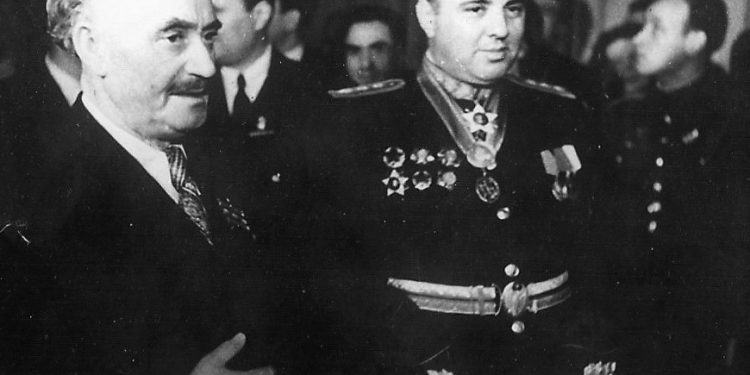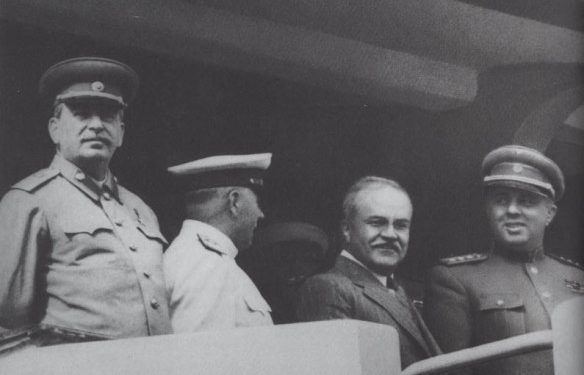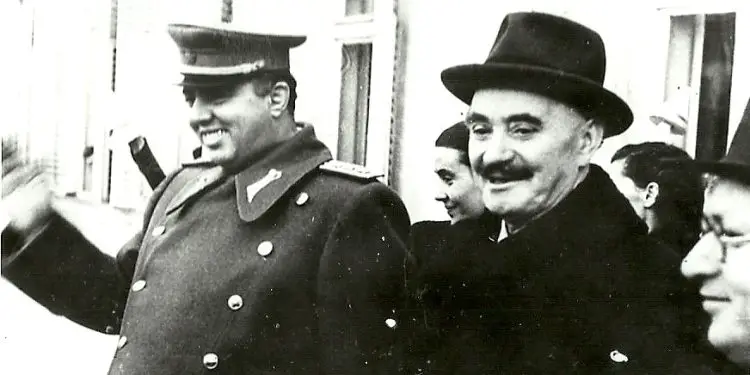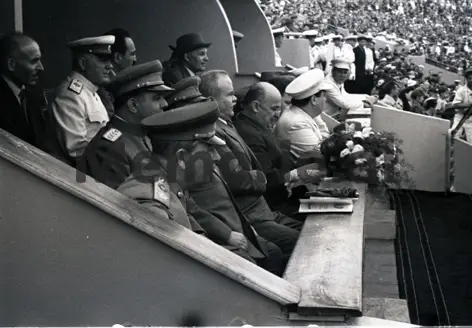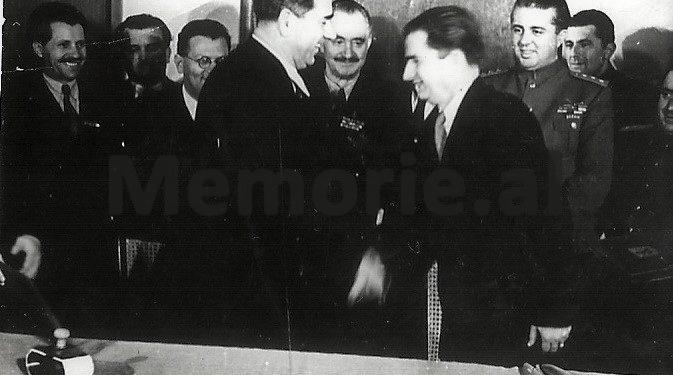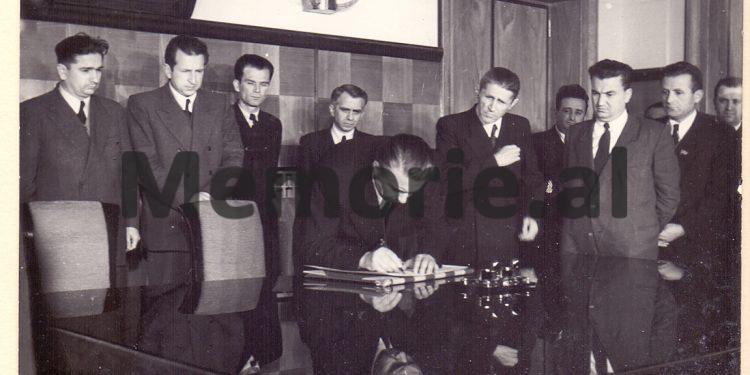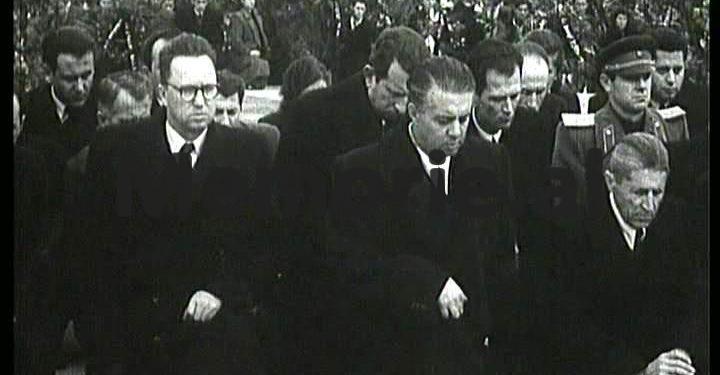By Fatos Baxhaku
The Behind-the-Scenes of Albania in the Secret Diary of the “Man from Leipzig” –
Memorie.al / The last 16 years of Gjergj Dimitrov must have been difficult times; otherwise, there is no way to explain the hermeticism that sometimes encompasses all the colossal material summarized in his “Diary.” No comment on what he meticulously put down on paper. No position of good or bad; just dates, names, and words spoken by others. Even the most tragic event of his life, the death of his son, Mitja, during the siege of Moscow, passes almost in silence, only noting dates and the names of professors. Occasionally, his Austrian wife appears, but the rest of the diary serves more as a shield to recall facts in case he needed to defend himself.
In this tangled mess of geographical names, heavy acronyms of Soviet institutions, phrases thrown here and there, and lengthy meetings, it is difficult to find the name of Albania. It is easier to notice its absence, particularly when it should have been present. This detail is used below to unveil the minds of the great communists concerning our future. While browsing through the “Diary,” we discover Tito’s dream of having an even greater Yugoslavia, followed by the first steps taken to realize Dimitrov’s idea of creating a Balkan confederation and the place that Albania would occupy within it.
The greatest mystery remains Stalin’s stance. Perfect in his style as a dictator, Stalin seems never to have appeared openly, with rare exceptions. A united Balkans, even under the banner of communism, would somehow put the newly established supremacy of the Soviet Union in a predicament. On the other hand, Stalin could not act against what had been agreed upon at the “Yalta deal.” This is why the dictator openly, but mostly secretly, always opposed the unifying trends in the Balkans.
It seems that precisely from this situation, Enver Hoxha benefited. In a Albania under Yugoslavia or in a confederation, he would have been merely a minor worker in the future giant Balkan state. Skillfully, he rapidly hung on Stalin’s coattails and continued to lead for another 40 years. That’s why in communist Tirana, until recently, Stalin was always remembered with admiration.
Finally, they catch us speechless…
Even for the first time in the “Diary”, Albania, by name, is mentioned in connection with Yugoslavia and with the problems that Tito’s partisans faced. It was the spring of 1942, and Tito’s partisans, still few in number, had begun to encounter their first difficulties. “You must help us, because our partisans are falling into the hands of the enemy, who then sends them to concentration camps in Albania,” Tito writes anxiously to Moscow. In the Kremlin, they still didn’t know well who they were dealing with. They only knew that “Walter” – that was Tito’s pseudonym during the War – had begun to connect with the English. The story of the concentration camps reminds us of Miladin Popović, interned in Albania. After 1942, we would have to wait a long time for Dimitrov to think of us Albanians again.
The Post-War Balkans
In January 1945, the enthusiasm in the Kremlin was at its peak. The Red Army was advancing everywhere, while the few remaining Germans had begun to disintegrate. Plans for territorial annexation and puppet governments began at this time, with similar stories filling the period of the “Cold War.” The first move for “union” was proposed by the Yugoslavs. Dimitrov was in principle in agreement but not in detail.
“In my opinion,” Dimitrov wrote in April 1944, “the most preferred orientation for the Balkans and for the Soviet Union would be the creation of a federation of South Slavs, composed of Bulgarians, Serbs, Croats, Slovenes, Montenegrins, and Macedonians, on the basis of equality. In this federation, Macedonia could gain freedom and national integrity and would no longer be an apple of discord among the Balkan states, but to speak about this publicly now and to spread such slogans, in my view, is hasty and perhaps harmful.”
Stalin immediately became worried. In January 1945, he wrote to Dimitrov: “We must support both Yugoslavia and Bulgaria if something happens to them. But for this, they must communicate with us about their significant initiatives, or at least inform us of their matters…!” Dimitrov seems to have tried to achieve his goal for many more years, even though now in Crimea, the three victors had divided the Balkans on paper. Relations with Tito had not been that good either.
“For the first time in the ‘Diary’, Albania is mentioned by name, linked to Yugoslavia and the troubles faced by Tito’s partisans. It is the spring of 1942, and Tito’s partisans, still few in number, have begun to encounter their first difficulties. ‘You must help us, because our partisans are falling into the hands of the enemy, who then sends them to concentration camps in Albania,’ Tito writes anxiously to Moscow. In the Kremlin, they still didn’t know well who they were dealing with. They only knew that ‘Walter’ – that was Tito’s pseudonym during the War – had begun to connect with the English. The story of the concentration camps reminds us of Miladin Popović, interned in Albania. After 1942, we would have to wait a long time for Dimitrov to think of us Albanians again.
The Post-War Balkans
In January 1945, the enthusiasm in the Kremlin was at its peak. The Red Army was advancing everywhere, while the few remaining Germans had begun to disintegrate. Plans for territorial annexation and puppet governments began at this time, with similar stories filling the period of the ‘Cold War’. The first move for ‘union’ was proposed by the Yugoslavs. Dimitrov was in principle in agreement but not in detail.
‘In my opinion,’ Dimitrov wrote in April 1944, ‘the most preferred orientation for the Balkans and for the Soviet Union would be the creation of a federation of South Slavs, formed by Bulgarians, Serbs, Croats, Slovenes, Montenegrins, and Macedonians, on the basis of equality. In this federation, Macedonia could gain freedom and national integrity and would no longer be an apple of discord among the Balkan states, but to speak about this publicly now and to spread such slogans, in my view, is hasty and perhaps harmful.’
Stalin immediately became worried. In January 1945, he wrote to Dimitrov: ‘We must support both Yugoslavia and Bulgaria if something happens to them. But for this, they must communicate with us regarding their important initiatives, or at least inform us about their matters…!’ Dimitrov seems to have tried to achieve his goal for many more years, even though now in Crimea, the three victors had divided the Balkans on paper. Relations with Tito had not been that good either.
“He is arrogant, underestimating the complexity of the situation and the difficulties that await us, there is a kind of intoxication from success…, ” writes in the note dated April 8, 1945. The discussions about the future state will continue, but they will never succeed. Dimitrov wanted a Yugoslav-Bulgarian confederation. Tito insisted on the idea of a federation where Serbia, Bulgaria, and perhaps others would have equal rights. In short, he envisioned returning Bulgaria to a Yugoslav republic. We can easily imagine what he thought about Albania, which he already had completely in his grasp.
January 1948, the secret protocol of the Kremlin
Towards the end of 1947 and the beginning of 1948, Dimitrov’s enthusiasm had gone so far that he proposed the creation of a Confederation of all Eastern European countries where communism had prevailed. According to him, Greece would also be included in the confederation. Meanwhile, talks between the Bulgarians and the Yugoslavs were increasingly deteriorating, while Tito had entered into the great challenge, disregarding Stalin. An expansion of his power even in Albania and on the borders of Greece would make him very powerful, while the Anglo-American allies would be very upset.
Alarmed by what was happening in the Balkans, Stalin summoned both parties to the Kremlin. On February 10, 1948, discussions began in one of the heavy halls of the Kremlin. The Soviet delegation included: Stalin, Molotov, Zhdanov, Malenkov, and Zorin. The Yugoslavs had sent Kardelj, Djilas, and Bakarić. The Bulgarians, under Dimitrov’s leadership, were: Kollarov and Trajço Kostov. At this meeting, the great ones of the Kremlin finally remembered Albania. Parts of these discussions are best published without comment, as Dimitrov noted in his Diary…!
Excerpts from Dimitrov’s “Diary” regarding the discussions with Stalin.
Molotov: “Between us, the Bulgarians, and the Yugoslavs, there are significant divergences that primarily appear in three fundamental issues: the Bulgarian-Yugoslav agreement, the interview of comrade Dimitrov, and the entry of Yugoslav troops into Albania (…). We learned by chance that at the end of January, a Yugoslav division would be sent to Albania. It would be positioned on the Albanian-Greek border and would repel a Greek attack supported by the Anglo-Americans.
The Yugoslav comrades did not warn us about this. When we asked Tito, he responded as follows: We would establish a Yugoslav military base in Albania for the common defense of the border. The Albanians told us they were convinced this was being done with our approval. From this, it follows that we assess the situation in Albania differently. This is a divergence that cannot be overlooked (…). Without consultations on such issues, actions should not be taken in the interest of the cause and our mutual relations (…).
Stalin: “(…) Regarding Albania, it seems that the Yugoslav comrades have taken it lightly. During the War, the three Allied powers recognized Albania’s independence. And they said they would protect it. Of all the war links, between reaction and democracy, Albania is our weakest point. It has not yet been accepted into the United Nations. The English and Americans do not recognize it. The issue is clear. There is no such weak entity. Even Albania, in international relations, is not protected. If Tito sends divisions there, or even a single battalion, this cannot be done secretly.
They will start shouting that Albania is occupied. Did Albania ask for help from Yugoslavia? And then the British and American racketeers will come out with the banner of protector of Albanian independence. Who, except for some unreasonable person, would set to work to form a completely unprotected front?! Now the Albanian army must be strengthened. They should be given instructors and armaments. Then, if Albania is attacked, it should turn to Yugoslavia for help (…).
Look at the war that has broken out in China, and we have no soldiers there. Are Albanians worse than the Chinese? Teach them, arm them, then they will know how to defend themselves. It is good for them to defend the independence of the country themselves. The Americans rarely attack alone. Otherwise, their attack would be weakened. You take these matters lightly, while they are so complicated. If the Greek partisans could manage, would you go into war?”
Kardelji: “No.”
Molotov: “(…) The Yugoslav comrades did not allow Albania to buy from us 5,000 tons of oats and sent them to seek it from Argentina (…).”
Stalin: “(…) The Yugoslavs seem to be afraid that we are taking Albania from them. Take Albania, but wisely. (…) Only three federations are possible and real: 1. Yugoslavia-Bulgaria, 2. Romania-Hungary, 3. Poland-Czechoslovakia. A confederation among the three is impossible (…).”
Kardelji: “We think that in uniting with Bulgaria, we should not rush for international reasons, as this could complicate the situation.”
Stalin: “Here you are mistaken. You must not delay the union of the three countries: Yugoslavia, Bulgaria, Albania. But it is essential that the national assemblies instruct their leaders to start the procedures for unification. It is better to begin with political unification and then send troops to Albania, as this would serve as a pretext for an attack. Without having a Peace Treaty with Bulgaria, the creation of the federation is premature (…).
The federation resolves all problems. The closeness between Bulgarians and Yugoslavs, both racially and in customs, is very great, and everyone will understand this union. But the Albanians will also benefit from the federation, because a united Albania will be formed, with almost double the population (…).”
Four days later, Molotov presided over the ceremony where the protocol was signed, according to which Yugoslavia and Bulgaria committed to a rapid union.
Albania’s independence had been cut off without a return ticket. Fortunately, the deep contradictions between Tito and Stalin had made it unacceptable. Shortly thereafter, a revealing letter arrived in Tirana from the Kremlin. Albania had been saved but was destined to remain solely under Enver Hoxha.
The History of a Diary.
Gjergj Dimitrov began keeping a diary in March 1933, at a time when he had to face the accusations raised by the Nazis. Since then, he did not stop writing almost every day for 16 years. Meetings, notes from various important gatherings, names of famous individuals from the then communist movement, as well as unfortunate ones erased from the annals of time—all of these could only be returned to history recently.
Dimitrov’s voluminous “Diary” summarizes two significant phases. The first phase covers the years of work in Moscow (1934 – 1945), and the second and final phase includes the few years during which he led Bulgaria, specifically the period 1945 – 1949. After his death, for many years, the “Diary” lay in a deep sleep in the archives of the Bulgarian Communist Party, until in 1990, someone remembered to dust it off and publish it. The “Diary” could not be published without the prior approval of Dimitrov’s family.
Bojko Dimitrov, Gjergj’s son, recounts in one of his forewords that he did not expect the publication of the book with much enthusiasm. “In ’90, everything was still murky, and my father’s diary could cause misunderstandings or troubles,” writes Bojko Dimitrov, former Foreign Minister of Bulgaria. However, Bojko was mistaken. The first publication of the “Diary” in Sofia was received with great curiosity.
Thanks to it, many dark parts of history began to be clarified. Immediately after this, the “Diary” was published in German, and then the publishing rights were purchased by Yale University in the USA. A few months later, a version was published in Italy that included only the years of residence in Moscow (Georgi Dimitrov, Diario, Gli anni di Mosca (1934 – 1945), Einaudi, Torino 2002, 968 pages, price 55 Euro).
The Man Who Defeated Hitler
Georgi Dimitrov (Kovachevci 1882 – Moscow 1949) was among the main founders of the Bulgarian Communist Party in 1919. From 1929 to 1933, he directed the Office for Western Europe in the Comintern in Berlin. He was arrested in March 1933 on the charge of organizing the burning of the Reichstag. He vigorously defended himself in the Leipzig trial, becoming a symbol of the anti-fascist movement.
Since September 1934, he settled in Moscow, where he served as the Secretary-General of the Comintern from 1935 until 1943. After the disbanding of the Comintern, he was responsible for the foreign relations of the Communist Party of the Soviet Union. He returned to Bulgaria in 1945, becoming its undisputed leader. He died in the Soviet Union, where he had gone for medical treatment. His death, like that of many other communist leaders of the time, remains shrouded in mystery.Memorie.al




